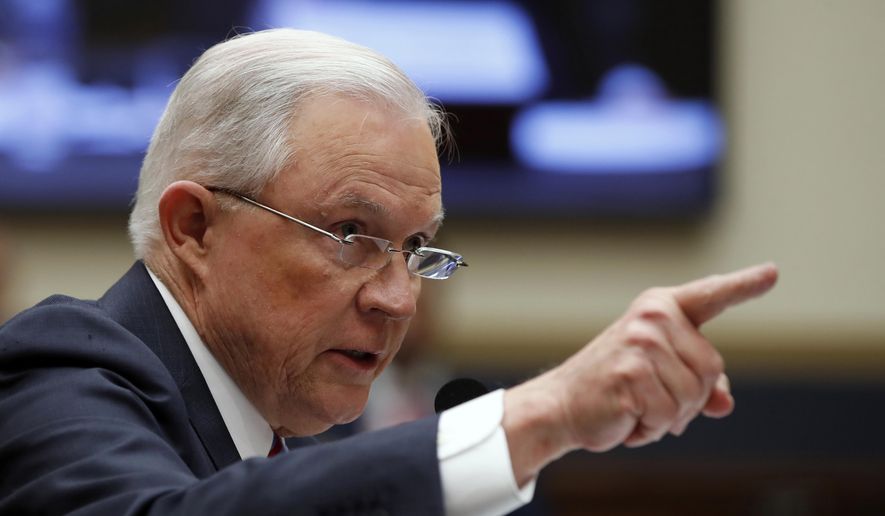The Justice Department moved to block AT&T’s attempt to acquire Time Warner Inc., saying in a lawsuit filed Monday that the $85 billion merger would shortchange American consumers by stifling innovation and potentially raising monthly cable bills.
Department officials said the decision was based on the law and that the White House was not involved and didn’t know about the lawsuit ahead of time. But critics were quick to question whether President Trump, who has been critical of Time Warner-owned network CNN, skewed the decision.
AT&T, which also owns DirecTV, is already the country’s biggest player in subscription television. Time Warner doesn’t directly compete, instead providing content, but Justice Department attorneys said the merger would give AT&T too much leverage against competitors by hiking prices for Time Warner programming.
“Were this merger allowed to proceed, the newly combined firm likely would — just as AT&T/DirecTV has already predicted — use its control of Time Warner’s popular programming as a weapon to harm competition,” the Trump administration said in the lawsuit. “AT&T/DirecTV would hinder its rivals by forcing them to pay hundreds of millions of dollars more per year for Time Warner’s networks, and it would use its increased power to slow the industry’s transition to new and exciting video distribution models that provide greater choice for consumers.”
AT&T officials said they intend to fight the lawsuit and will not agree to any settlement that would require divestiture of CNN.
AT&T CEO Randall Stephenson said he didn’t know whether the president’s animosity toward CNN had anything to do with the Justice Department’s lawsuit.
“But nobody should be surprised that the question keeps coming up because we witnessed such an abrupt change in the application of antitrust law here,” he said. “The bottom line is we cannot and will not be party to any agreement that would even give the perception of compromising the First Amendment protections of the press. … So any agreement that results in us forfeiting control of CNN whether directly or indirectly is a nonstarter.”
Mr. Trump has spoken out against the merger since the proposal was announced last year before his election.
Asked about his thoughts again last week, Mr. Trump told reporters that he was still opposed but didn’t have anything to do with decision.
“I did make a comment in the past as to what I think,” Mr. Trump said. “I do feel that you should have as many news outlets as you can, especially since so many of them are fake.”
A Justice Department official who briefed reporters about the lawsuit on background said Monday that Mr. Trump’s comments about CNN “have no bearing in this decision.”
Instead, Assistant Attorney General Makan Delrahim, head of the department’s antitrust division, said the merger was unlawful.
“Absent an adequate remedy that would fully prevent the harms this merger would cause, the only appropriate action for the Department of Justice is to seek an injunction from a federal judge blocking the entire transaction,” he said in a statement.
Just a year ago, Mr. Delrahim expressed the opposite view, saying in an interview with a Canadian broadcaster that the deal probably didn’t violate the law.
AT&T said the Justice Department is doing an about-face.
David R. McAtee II, the company’s general counsel, said the last time a Justice Department lawsuit blocked a vertical merger was in the Nixon administration. He said vertical mergers are “routinely approved because they benefit consumers without removing any competitor from the market,” Mr. McAtee said.
The Justice Department, briefing reporters, said the problem isn’t that the two companies compete but rather how they could wield their combined offering.
“Vertical mergers can cause competitive harm, and in this case this one does,” the official said.
Mr. Trump’s political opponents have been put in an odd position. Some Democrats and good-government groups who have been fierce critics of the president also have opposed the merger.
This summer, 11 Senate Democrats wrote to the Justice Department asking officials to closely scrutinize the proposed merger. The lawmakers said such a merger could increase its own viewership by limiting AT&T subscribers’ access to other content or by prioritizing its own.
House Democrats, meanwhile, sent a demand this month for congressional hearings into Mr. Trump’s role in the decision.
Technology analysts say the Justice Department has a credible case.
“On its face, the AT&T-Time Warner merger clearly violates antitrust law, and President Trump’s railing against CNN should not have played any role in the Justice Department’s decision to bring suit,” said Michael Copps, a former commissioner of the Federal Communications Commission and a special adviser to Common Cause. “Blessing AT&T’s monopolistic bid to acquire Time Warner would harm consumers and the public interest. As with any antitrust proceeding, the facts matter and there are ample grounds for DOJ to cite in its opposition.”
Berin Szoka, president of TechFreedom, predicted an uphill battle for the department to halt the merger.
“Sometimes, it’s less harmful to let mergers go through with carefully targeted conduct remedies than to block acquisitions entirely,” he said. “That’s particularly true in tech markets: Big companies always struggle with disruptive innovation — the ’Innovator’s Dilemma.’ The less clear it is what the market will look like in the future, the more important corporate acquisitions are to acquire new talent.”
• Andrea Noble can be reached at anoble@washingtontimes.com.




Please read our comment policy before commenting.